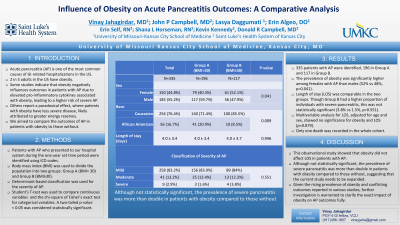Monday Poster Session
Category: Biliary/Pancreas
P1735 - Influence of Obesity on Acute Pancreatitis Outcomes: A Comparative Analysis
Monday, October 28, 2024
10:30 AM - 4:00 PM ET
Location: Exhibit Hall E

Has Audio

Vinay Jahagirdar, MD
University of Missouri - Kansas City School of Medicine
Kansas City, MO
Presenting Author(s)
Vinay Jahagirdar, MD1, John P Campbell, MD2, Lasya Daggumati, 3, Erin Algeo, DO3, Erin Self, RN2, Shana L Horseman, RN2, Kevin Kennedy, 2, Donald R Campbell, MD2
1University of Missouri - Kansas City School of Medicine, Kansas City, MO; 2Saint Luke's Health System of Kansas City, Kansas City, MO; 3University of Missouri Kansas City School of Medicine, Kansas City, MO
Introduction: Acute pancreatitis (AP) is one of the most common causes of GI-related hospitalizations in the US. Currently, 2 in 5 adults in the US have obesity. Some studies indicate that obesity negatively influences outcomes in patients with AP due to elevated pro-inflammatory cytokines associated with obesity, leading to a higher risk of severe AP. Others report a paradoxical effect, where patients with obesity have less severe disease, likely attributed to greater energy reserves. We aimed to compare the outcomes of AP in patients with obesity to those without.
Methods: Patients with AP who presented to our hospital system during the one-year set time period were identified using ICD codes. Body mass index (BMI) was used to divide the population into two groups: Group A (BMI< 30) and Group B (BMI≥30). Multiple outcomes were evaluated. Determinant-based classification was used for the severity of AP. Student’s T-test was used to compare continuous variables and the chi-square of Fisher’s exact test for categorical variables. A two-tailed p-value < 0.05 was considered statistically significant.
Results: 335 patients with AP were identified, 196 in Group A and 117 in Group B. The prevalence of obesity was significantly higher among females with AP than males (52% vs 48%, p=0.041). Length of stay (LOS) was comparable in the two groups. Though Group B had a higher proportion of individuals with severe pancreatitis, this was not statistically significant (3.8% vs 1.5%, p=0.551). Multivariable analysis for LOS, adjusted for age and sex, showed no significance for obesity and LOS (p=0.879). Only one death was recorded in the whole cohort.
Discussion: This observational study showed that obesity did not affect LOS in patients with AP. However, although not statistically significant, the prevalence of severe pancreatitis was more than double in patients with obesity compared to those without, suggesting that the current study needs to be expanded. Given the rising prevalence of obesity and conflicting outcomes reported in various studies, further investigation is warranted to clarify the exact impact of obesity on AP outcomes fully.
Note: The table for this abstract can be viewed in the ePoster Gallery section of the ACG 2024 ePoster Site or in The American Journal of Gastroenterology's abstract supplement issue, both of which will be available starting October 27, 2024.
Disclosures:
Vinay Jahagirdar, MD1, John P Campbell, MD2, Lasya Daggumati, 3, Erin Algeo, DO3, Erin Self, RN2, Shana L Horseman, RN2, Kevin Kennedy, 2, Donald R Campbell, MD2. P1735 - Influence of Obesity on Acute Pancreatitis Outcomes: A Comparative Analysis, ACG 2024 Annual Scientific Meeting Abstracts. Philadelphia, PA: American College of Gastroenterology.
1University of Missouri - Kansas City School of Medicine, Kansas City, MO; 2Saint Luke's Health System of Kansas City, Kansas City, MO; 3University of Missouri Kansas City School of Medicine, Kansas City, MO
Introduction: Acute pancreatitis (AP) is one of the most common causes of GI-related hospitalizations in the US. Currently, 2 in 5 adults in the US have obesity. Some studies indicate that obesity negatively influences outcomes in patients with AP due to elevated pro-inflammatory cytokines associated with obesity, leading to a higher risk of severe AP. Others report a paradoxical effect, where patients with obesity have less severe disease, likely attributed to greater energy reserves. We aimed to compare the outcomes of AP in patients with obesity to those without.
Methods: Patients with AP who presented to our hospital system during the one-year set time period were identified using ICD codes. Body mass index (BMI) was used to divide the population into two groups: Group A (BMI< 30) and Group B (BMI≥30). Multiple outcomes were evaluated. Determinant-based classification was used for the severity of AP. Student’s T-test was used to compare continuous variables and the chi-square of Fisher’s exact test for categorical variables. A two-tailed p-value < 0.05 was considered statistically significant.
Results: 335 patients with AP were identified, 196 in Group A and 117 in Group B. The prevalence of obesity was significantly higher among females with AP than males (52% vs 48%, p=0.041). Length of stay (LOS) was comparable in the two groups. Though Group B had a higher proportion of individuals with severe pancreatitis, this was not statistically significant (3.8% vs 1.5%, p=0.551). Multivariable analysis for LOS, adjusted for age and sex, showed no significance for obesity and LOS (p=0.879). Only one death was recorded in the whole cohort.
Discussion: This observational study showed that obesity did not affect LOS in patients with AP. However, although not statistically significant, the prevalence of severe pancreatitis was more than double in patients with obesity compared to those without, suggesting that the current study needs to be expanded. Given the rising prevalence of obesity and conflicting outcomes reported in various studies, further investigation is warranted to clarify the exact impact of obesity on AP outcomes fully.
Note: The table for this abstract can be viewed in the ePoster Gallery section of the ACG 2024 ePoster Site or in The American Journal of Gastroenterology's abstract supplement issue, both of which will be available starting October 27, 2024.
Disclosures:
Vinay Jahagirdar indicated no relevant financial relationships.
John P Campbell indicated no relevant financial relationships.
Lasya Daggumati indicated no relevant financial relationships.
Erin Algeo indicated no relevant financial relationships.
Erin Self indicated no relevant financial relationships.
Shana L Horseman indicated no relevant financial relationships.
Kevin Kennedy indicated no relevant financial relationships.
Donald R Campbell indicated no relevant financial relationships.
Vinay Jahagirdar, MD1, John P Campbell, MD2, Lasya Daggumati, 3, Erin Algeo, DO3, Erin Self, RN2, Shana L Horseman, RN2, Kevin Kennedy, 2, Donald R Campbell, MD2. P1735 - Influence of Obesity on Acute Pancreatitis Outcomes: A Comparative Analysis, ACG 2024 Annual Scientific Meeting Abstracts. Philadelphia, PA: American College of Gastroenterology.

